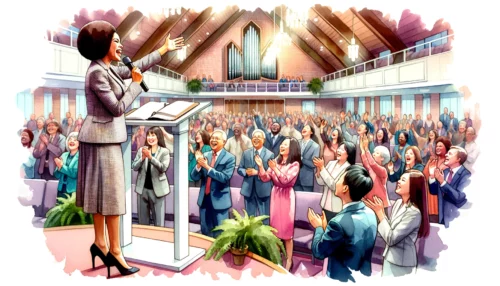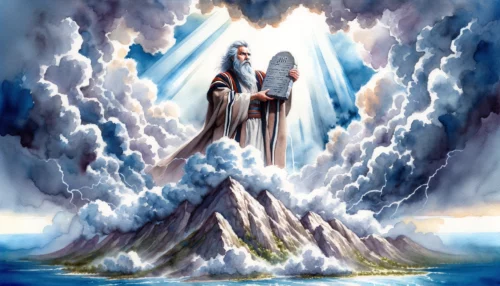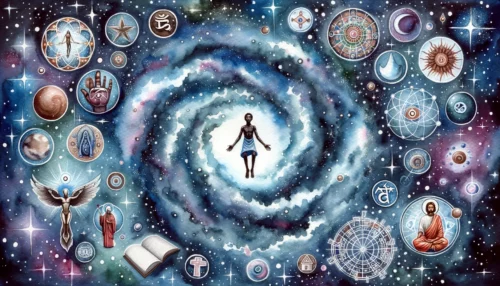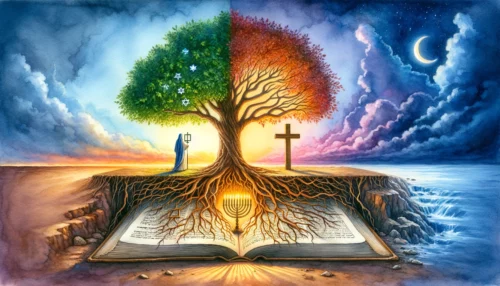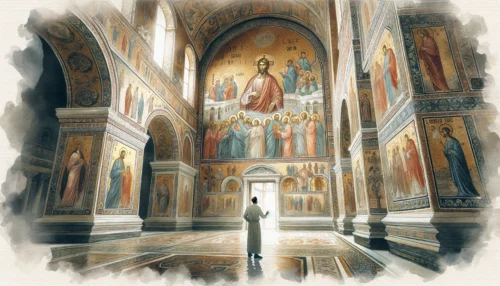The rise of various faiths and belief systems in contemporary times has led to numerous discussions and debates among the global Christian community. Of these, Scientology has particularly captured the public’s attention due to its unique doctrines and high-profile adherents. As people of faith, we find it essential to understand and respectfully engage with these different belief systems, even as we examine them in light of our Christian faith.
Understanding the Foundations of Scientology
Born in the mind of science fiction writer L. Ron Hubbard in the early 1950s, Scientology presents itself as a religion that seeks to understand the nature of the self or soul, referred to as the “Thetan.” Thetans, according to Scientology, are immortal beings, distinct from both the mind and body. They claim that through a process called “auditing,” individuals can shed harmful psychological burdens, leading to increased spiritual awareness and capabilities.
A significant text for Scientology is Hubbard’s book, “Dianetics: The Modern Science of Mental Health.” Dianetics introduced the concept of auditing. The method uses a device known as an “E-meter” to measure the strength of small electrical charges in the body. These charges are believed to change when a person revisits and vocalizes past experiences and traumas.
Auditing sessions are intended to help individuals uncover and discard traumatic memories stored in a portion of the mind Hubbard termed the “reactive mind.” By purging these, Scientology holds that individuals can attain a state of “Clear,” where the reactive mind no longer influences them.
Hubbard later expanded upon Dianetics to create Scientology. He presented the Church of Scientology in 1953, with headquarters now based in Los Angeles. The Church has been the subject of numerous controversies and legal battles concerning its status as a religion, among other issues.
Scientology proposes an elaborate cosmology involving past lives and ancient intergalactic civilizations. They believe that many human problems stem from the lingering effects of past traumas, including those incurred in previous lifetimes.
Hubbard’s teachings in Scientology assert that people are essentially good and that their spiritual well-being depends upon themselves, their fellows, and their attainment of harmony with the universe. They stress the importance of personal spiritual enlightenment, obtained through the practices of auditing and studying Scientology texts.
Scientology focuses on the individual and their spiritual journey. There’s no single deity to worship, rather, each person is seen as a divine Thetan. The Church provides guidelines for ethical living but does not prescribe a set of rules akin to the Ten Commandments.
The basis of Scientology lies in the teachings of L. Ron Hubbard, focusing on the nature of the self or Thetan. Its main practice, auditing, seeks to rid individuals of psychological burdens to achieve a state of “Clear.” The Church of Scientology provides a set of ethical guidelines and asserts the importance of personal spiritual enlightenment. Their cosmology involves past lives and the belief that humans are fundamentally good, aiming for harmony with the universe.
Key Doctrines and Practices in Scientology
In the heart of Scientology lies the practice of auditing. Auditing is a process that uses an E-meter device to guide the individual, or “preclear,” through their past experiences, emotions, and traumas. It resembles a counselling session but differs fundamentally in its goals and methods. Scientology contends that this process rids the preclear of the negative effects of past traumas, eventually leading to the state of “Clear.” This state is considered an essential step towards spiritual advancement.
The next stage after reaching “Clear” is ascending through various “Operating Thetan” or “OT” levels. At these advanced stages, members are said to gain abilities that transcend the limits of the material world. They’re introduced to more complex teachings, some of which are closely guarded secrets within the Church.
The Bridge to Total Freedom is a chart that outlines the path a follower of Scientology takes from their initial involvement up to the highest spiritual levels. It shows the two parallel paths of “Training” and “Processing.” Training involves learning the theories and techniques of Dianetics and Scientology, and Processing refers to the practice of auditing.
Scientology also holds a strong emphasis on communication as a crucial aspect of spiritual development. The Church offers training routines, known as TRs, aimed at improving specific aspects of communication and interpersonal interaction. They believe that mastering these skills can help in all aspects of life, including the spiritual.
The ethical system of Scientology, based on Hubbard’s writings, is built around the idea that increased survival in all aspects of life — oneself, family, group, mankind, all life forms, the physical universe, the spiritual universe, and the Supreme Being — is good. Violating these dynamics of existence, according to Scientology, diminishes survival and is considered unethical.
The Church operates several organizations under its umbrella, such as Narconon and Criminon, which respectively target substance abuse recovery and criminal rehabilitation using Hubbard’s methods.
Scientology features several key practices and doctrines. At the core is auditing, leading to the state of “Clear” and progression through OT levels. The Bridge to Total Freedom maps the spiritual journey of a Scientologist. They also emphasize on communication and ethics, which focus on increased survival across various aspects of life. The Church runs several organizations aligned with its belief system and methods.
A Biblical Perspective on Scientology
In comparison to Christianity, Scientology diverges in several key aspects, especially concerning our understanding of God, salvation, and the nature of humanity.
In Christian belief, God is a personal and loving Being, existing in three persons – the Father, the Son, and the Holy Spirit. These three coexist and co-eternal, representing one divine essence (Matthew 28:19). In contrast, Scientology does not emphasize the worship of a personal deity, focusing instead on the spiritual evolution of the individual. The Supreme Being in Scientology is impersonal and is not actively involved in the affairs of the universe.
On the topic of salvation, Christianity teaches that it is by grace through faith in Jesus Christ that we are saved, not by our works (Ephesians 2:8-9). In Scientology, salvation is a matter of individual enlightenment and self-improvement through the practice of auditing and study, with no reference to a divine sacrifice for humanity’s sins.
The nature of humanity also differs significantly in both faiths. Christianity views humans as beings created in the image of God (Genesis 1:27), inherently valuable but fallen due to sin. Salvation and restoration come through faith in Jesus Christ. Scientology, on the other hand, sees humans as immortal beings, or Thetans, who are fundamentally good but hindered by the adverse effects of past traumas.
Christianity’s message is universal, applicable to all regardless of status or condition. Scientology’s advanced spiritual teachings, in contrast, are available only to those who’ve made significant progress in their study and practice of the religion, often requiring considerable financial investment.
The Christian community values open examination and discussion of its faith, with the Bible and its teachings available to all. Conversely, some of Scientology’s central tenets, especially concerning OT levels, are kept confidential and are only revealed to adherents who’ve reached specific stages of advancement.
Christianity and Scientology differ fundamentally in their understanding of God, salvation, and human nature. While Christianity highlights a personal and loving God, the grace of salvation through faith in Jesus Christ, and humanity’s value and need for redemption, Scientology emphasizes personal spiritual evolution, self-improvement as a means to salvation, and views humans as inherently good immortal beings. Furthermore, the accessibility and transparency of teachings differ significantly between the two belief systems.
Seeking Truth in a Diverse World
Through this exploration, we’ve shed light on the origins, practices, and doctrines of Scientology, all seen through the lens of Christian understanding. It’s been a journey to grasp the depth of a faith that is often misunderstood and misrepresented, all the while relating it back to our Christian values and beliefs.
Here are three questions to ponder:
- How does understanding Scientology influence your perspective on faith and spiritual exploration?
- What elements of Christianity become more apparent when contrasted with the teachings of Scientology?
- How can we engage respectfully with people who hold different beliefs while staying true to our own faith?
As we journey through the expansive world of beliefs, we must always return to the bedrock of our Christian faith. The exploration of different faith systems allows us to reaffirm our understanding of God’s truth. So, keep on this path of knowledge, remembering always that every step brings you back to the heart of Christ’s teachings.







